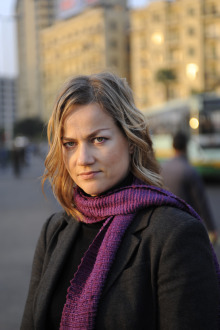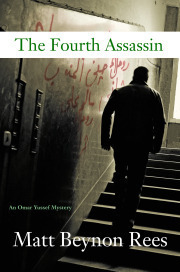Matt Rees's Blog - Posts Tagged "cairo"
Obama's speech: the view from Jerusalem
President Barack Obama spelled out what he expects of the Israeli government in his Cairo speech, issuing a challenge that most commentators here believe Prime Minister Benjamin Netanyahu has no way of meeting [I wrote on Global Post today:].
Obama’s speech, carried live on all three main Israeli television stations, made clear his firm opposition to any sort of building in Israel’s West Bank settlements. “This construction violates previous agreements and undermines efforts to achieve peace,” Obama said. “It is time for these settlements to stop.”
The realization that Obama is serious about halting settlements has been growing in Israel since Secretary of State Hillary Clinton visited in early March. At first Israeli politicians and diplomats thought it could be dealt with by the same sleight of hand that stymied previous administrations — Israel would agree to a freeze on settlement construction, except for “natural growth” to accommodate the children of existing settlers. In reality that meant as much building as Israel wanted.
Since Netanyahu’s visit to Washington two weeks ago, aggrieved Israeli government officials (who weren’t immediately available to comment on Obama's speech) have complained that there were unwritten agreements with the Bush White House allowing Israel to build in the settlements, provided they pulled out of “illegal outposts” — mainly composed of a few young settlers living in shipping containers on hillsides across the valley from existing settlements.
Obama’s speech made it clear that such unwritten promises are not part of the debate. Read more....
Obama’s speech, carried live on all three main Israeli television stations, made clear his firm opposition to any sort of building in Israel’s West Bank settlements. “This construction violates previous agreements and undermines efforts to achieve peace,” Obama said. “It is time for these settlements to stop.”
The realization that Obama is serious about halting settlements has been growing in Israel since Secretary of State Hillary Clinton visited in early March. At first Israeli politicians and diplomats thought it could be dealt with by the same sleight of hand that stymied previous administrations — Israel would agree to a freeze on settlement construction, except for “natural growth” to accommodate the children of existing settlers. In reality that meant as much building as Israel wanted.
Since Netanyahu’s visit to Washington two weeks ago, aggrieved Israeli government officials (who weren’t immediately available to comment on Obama's speech) have complained that there were unwritten agreements with the Bush White House allowing Israel to build in the settlements, provided they pulled out of “illegal outposts” — mainly composed of a few young settlers living in shipping containers on hillsides across the valley from existing settlements.
Obama’s speech made it clear that such unwritten promises are not part of the debate. Read more....
Guardian: Top 10 Arab-world novels
"The Arab literary world and Western publishing don't cross over much. The literature of the Arab world is largely unknown in the west, and even westerners who write about Arabs are sometimes seen as fringe, cult writers. That comes at a cost to the west, because literature could be such an important bridge between two cultures so much at odds. What we see of the Arab world comes from news reports of war and other madness. Literature would be a much more profound contact.
"I live in Jerusalem and write fiction about the Palestinians because it's a better way to understand the reality of life in Palestine than journalism and non-fiction. The books in this list, in their different ways, unveil elements of life across the Arab world that you won't see in the newspaper or on TV."
Published on January 13, 2010 23:17
•
Tags:
abdulrahman-munif, ala-al-aswany, algeria, arab, arab-fiction, arab-novels, british-newspapers, cairo, egypt, emile-habiby, ibrahim-nasrallah, iraq, israel, kanaan-makiya, lawrence-durrell, middle-east, naguib-mahfouz, palestine, palestinians, paul-bowles, tariq-ali, the-guardian, yasmina-khadra
How to keep up on the Middle East
 JERUSALEM — Time was anyone with an interest in the Middle East could be guaranteed a couple of books a year would be brought out by U.S. journalists based in the region. Now many of those correspondents are history, with news bureaus closing and those that remain cutting back. The new books written by Americans tend to be by think-tank types or others whose agenda is hard to figure out.
JERUSALEM — Time was anyone with an interest in the Middle East could be guaranteed a couple of books a year would be brought out by U.S. journalists based in the region. Now many of those correspondents are history, with news bureaus closing and those that remain cutting back. The new books written by Americans tend to be by think-tank types or others whose agenda is hard to figure out.But you know that already. It’s one reason you’re reading GlobalPost, which was founded partially to replace the disappearing corps of U.S. foreign correspondents. [That's where I first posted this.]
So GlobalPost has solved your journalism problem. But, still, what’re you going to do about the books? With a book written by a foreign correspondent you couldn’t always be sure of a good read —I’ve ploughed through some stinky “notebook dumps” in my time by reporters who padded pages with meaningless tales of their Palestinian and Israeli “friends” — but you at least knew that it was by a responsible journalist answerable to editors and readers even for his extracurricular writings. Not so with think-tank academics whose financing and agenda can make for deeply skewed accounts.
The answer: Europeans. A new book demonstrates what I’m talking about.
“Hold onto Your Veil, Fatima!” is an expose of contemporary Egypt that’s at once harrowing and humorous by Sanna Negus, a reporter for Finland’s YLE Radio and TV.
Negus came to the Middle East in the mid-1990s for graduate studies in Cairo, largely because she wanted to learn an unusual language and figured Arabic fit the bill. (It’s not as unusual as Finnish, but then she already had that covered.) She returned to Cairo, working for the English-language Cairo Times and staying for a decade as YLE’s correspondent. She’s been based in Jerusalem the last two years. (Lawrence Wright, who won a Pulitzer for “The Looming Tower: al-Qaeda and the Road to 9/11,” writes in the book’s foreword that Negus is “one of the most informed and well-connected reporters in the region.”)
Read the rest of this post on my blog The Man of Twists and Turns.
Published on June 20, 2010 03:16
•
Tags:
9-11, american-colony, cairo, cairo-times, crime-fiction, egypt, female-circumcision, finland, genital-mutilation, global-post, hold-onto-your-veil-fatima, israe, jerusalem, journalism, lawrence-wright, middle-east, middle-east-books, pulitzer-prize, sanna-negus, the-looming-tower, time-magazine, women
The Barbara Cartland of Cairo…Sort of: Sanna Negus’s Writing Life interview
 Cairo is a place we all know to some degree, even if only the image of the pyramids and the Sphinx. A short visit there is enough to make you wonder about how much of this teeming metropolis you really don’t know. No writer gets so deep as Sanna Negus under the skin of this ancient city, which remains key to the future of the benighted Middle East. Sanna’s the Middle East correspondent for Finnish radio and television. Her new book “Hold onto Your Veil, Fatima! And Other Snapshots of Life in Contemporary Egypt” is a stunning portrayal of Egypt that’s both homage and expose. Pulitzer winner Lawrence Wright calls her “one of the most informed and well-connected reporters in the region.” She’s also one of the best writers. Here she talks about the decade she spent in Cairo (before moving to Jerusalem) and how she wrote her book.
Cairo is a place we all know to some degree, even if only the image of the pyramids and the Sphinx. A short visit there is enough to make you wonder about how much of this teeming metropolis you really don’t know. No writer gets so deep as Sanna Negus under the skin of this ancient city, which remains key to the future of the benighted Middle East. Sanna’s the Middle East correspondent for Finnish radio and television. Her new book “Hold onto Your Veil, Fatima! And Other Snapshots of Life in Contemporary Egypt” is a stunning portrayal of Egypt that’s both homage and expose. Pulitzer winner Lawrence Wright calls her “one of the most informed and well-connected reporters in the region.” She’s also one of the best writers. Here she talks about the decade she spent in Cairo (before moving to Jerusalem) and how she wrote her book.How long did it take you to get published?
The initial Finnish version (2005) came out quite smoothly. I first got a writing grant from the biggest publishing house in Finland, WSOY, which allowed me to work on three sample chapters. Less than a year later we signed a contract. The English version took longer to publish, mainly because I got distracted by other things. One UK publishing house was at first interested, but then withdrew and I guess it depressed me and I buried the project for a while. After some friends kicked my behind and told me to get my act together, I took a look at my bookshelf’s Middle Eastern books. So I wrote to Garnet on Monday, they answered on Tuesday and on Friday I got a contract!
Would you recommend any books on writing?
This being my first book, I figured I should probably look into some writing guides. So I read a couple of books in Finnish. While these books gave a boost to my confidence, they still didn’t solve the problem of the blank page. When I was taking my first steps as a journalist (and I never studied journalism or literature), I found Jon Franklin’s Writing For Story useful. But at the end of the day, it’s better to read what other people have written in your genre.
What’s a typical writing day?
The morning starts with some form of exercise, followed by breakfast and several hours of futzing around (checking my email every five minutes, making yet another cup of coffee, doing laundry, going to a supermarket to buy a single item…) Typically I would do research or write down interviews during the day and write late into the night. My creative powers unfold after sunset.
Read the rest of this post on my blog The Man of Twists and Turns.
Published on July 15, 2010 03:17
•
Tags:
barbara-cartland, cairo, egypt, fear-and-loathing-in-las-vegas, finland, hunter-thompson, interviews, jerusalem, jon-franklin, michael-chabon, michel-houellebecq, middle-east, nonfiction-books, orhan-pamuk, salman-rushdie, sanna-negus, sofi-oksanen, stieg-larsson, the-writing-life, writing, writing-for-story
Omar Yussef predicted Cairo and Tunis
 If you’ve been wondering why the people of Tunisia and Egypt have risen up against their dictators and why it caught Washington with pants down, it’s because you didn’t read THE FOURTH ASSASSIN, the latest of my Palestinian crime novels.
If you’ve been wondering why the people of Tunisia and Egypt have risen up against their dictators and why it caught Washington with pants down, it’s because you didn’t read THE FOURTH ASSASSIN, the latest of my Palestinian crime novels.In THE FOURTH ASSASSIN, which was published exactly a year ago, my Palestinian sleuth Omar Yussef travels to New York for a conference at the UN. While there, he uncovers an assassination plot. But he also has to address the conference about the life of ordinary Palestinians —— and the people of other Arab countries.
Here’s a passage from that chapter of the book, with Omar addressing the delegates from Arab countries and the Americans:
“ ‘It may be hard for you to understand, but what ordinary Palestinians want and what they battle for every day is precisely what’s denied to most of your citizens in the Arab countries: freedom and economic prosperity.’
The Libyan delegate removed his finger from his nose and flicked it angrily. The Syrian strode down from the rear of the hall, dropping his
cigarette. The Lebanese stepped out the butt on the carpet as he followed.
‘How can you, the Arab countries, dictate a solution for the Palestinians, when you suffer from many of the same problems? In fact, you, the governing class, thrive on the lack of democracy, the inequality of wealth. Take away the Israeli occupation and the Palestinians would be closer to freedom and a functioning economy than most of your peoples.’
Read the rest of this post on my blog The Man of Twists and Turns.
Published on February 02, 2011 01:00
•
Tags:
bashar-assad, brooklyn, cairo, crime-fiction, egypt, middle-east, new-york, omar-yussef, politics, syria, the-fourth-assassin, tunis, united-nations, washington



